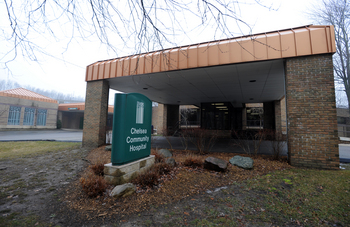Chelsea hospital implements $12 million electronic medical records system as expansion continues
In an effort to save money, reduce physician errors and ensure excellent hospital care, Chelsea Community Hospital is investing $12 million to adopt an electronic medical records system.

Chelsea Community Hospital is transitioning to an electronic medical records system.
File photo | AnnArbor.com
The transition, which will eliminate the need to keep paper records, is expected to occur Saturday.
The system has been tailored to incorporate specific elements requested by CCH, said Kathy Brubaker, executive vice-president for patient care and the executive leading the project.
“It certainly encompasses the documentation by nurses and physicians,” she said. “We are changing all of our patient registrations, patient systems, surgical information systems, patient billing, and pharmacy.”
The new system will also prevent transcription errors, eliminate the need to decipher handwriting and help cut the wait time for test results.
Like many other hospitals around the country implementing electronic health records, CCH is seeking federal government incentives to help cover the costs of the transition, CCH President and CEO Kathleen Griffiths said.
Participating hospitals must meet certain criteria in order to be eligible and demonstrate “meaningful use,” Griffiths said.
“The government wants to be sure that those dollars are being put to good use,” she said.
According to the U.S. Centers for Medicare and Medicaid Services, the incentive programs provide payments to eligible professionals and hospitals for transitioning to certified electronic health record systems. The federal economic stimulus package passed by Congress in early 2009 included a package of incentives designed to nudge hospitals to adopt electronic health records.
Providers who treat Medicare and Medicaid patients could lose government funding if they do not switch over to a paperless system within five years. Griffiths said the hospital took that into account when deciding to make the transition.
“It played a part in Chelsea as well as the Trinity System as a whole, but our motivation to moving to electronic records really stems from much earlier,” she said. “We’ve been ready to switch over. The primary motivation is to improve the quality of safety and care that is delivered in the hospital. In the long run, we hope it will be cost effective for us.”
She added: “We do believe that caregivers will be able to provide better and faster care,” Brubaker said. “Communication of information between providers will be improved with the use of electronic health systems.”
The hospital has also taken precautions to make sure sensitive patient information is protected when it becomes digitized, she said.
“We share in the concern that our systems be secure so there’s quite a bit of work to make sure that each user has security levels assigned and that clinicians have appropriate access,” Griffiths said.
The transition has been a gradual process and began more than a year ago and involved extensive testing, Brubaker said.
“It’s been a whole system of looking at the application itself and looking at how we do things currently to see how we’ll be using the electronic record,” she said.
CCH got assistance from officials who also helped the St. Joseph Mercy Hospital in Superior Township transition to an electronic medical records system.
More than 1,000 employees had to be trained to use the system.
“It’s almost all of our staff,” Griffiths said. “It’s huge. It’s an implementation that changes 90 percent of the processes we have. It is a huge, huge initiative.”
The transition to the new system could not have occurred at a better time, Griffiths said, as the hospital continues construction on its $60 million, 110,000-square-foot expansion.
“I think one of the things that’s fortunate is that we’re implementing it now before moving into the new hospital,” she said. “We will not only have state-of-the-art facilities, but state-of-the-art records systems.”
The construction of the new facility is still on schedule to be completed by the end of 2012.
Brubaker said the new, larger facility would also have ample room for the equipment needed to run and support the electronic medical records system.
“We will have a large number of computer devices in our current facility and so space is a little limited,” Brubaker said. “I think we’ll be in a better position.”
Katrease Stafford is a freelance reporter for AnnArbor.com.


Comments
1bit
Sun, Jul 10, 2011 : 7:37 p.m.
I'm not sure there is evidence that EHRs actually "reduce physician errors and ensure excellent hospital care". Some do allow access to government money and does allow for extensive "capturing" of charges that might otherwise go unbilled. But EHRs are the future, so complaining is pointless. However, if your loved one is in the hospital, I would not rely on the computers to be foolproof and it is a good idea to bring a list of your loved one's medications and make sure it lines up with what they are being given in the hospital.
SonnyDog09
Sun, Jul 10, 2011 : 11:13 a.m.
Here is a link to more information on Trinity's Genesis: <a href="http://www.trinity-health.org/body.cfm?id=52" rel='nofollow'>http://www.trinity-health.org/body.cfm?id=52</a>
SonnyDog09
Sun, Jul 10, 2011 : 11:12 a.m.
Unless Trinity has changed since I left, they are *not* deploying software from Genesis Systems. Genesis is Trinity's internal code name for deploying standardized systems across the enterprise. The components include Cerner Powerchart as EMR and McKesson HealthQuest as their patient management system. At one point, this was known as "project genesis", but they dropped "project" from the name. Cerner Powerchart is the certified EMR, and if Chelsea uses it correctly, they should qualify for meaningful use payments.